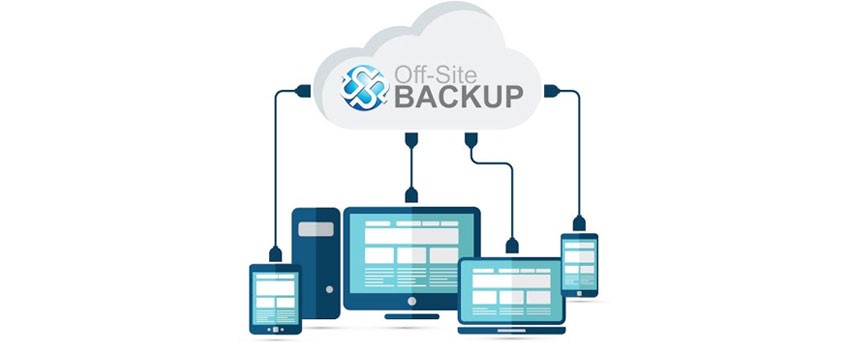With our growing reliance on digital assets, every business needs a backup of its primary data to keep it protected from any data loss calamity, such as hardware failure, sudden power outage, cyber-attack, system malfunction, etc. You never know when a data calamity hit your business, so you must plan the disaster recovery beforehand. Having a local backup is one way to protect the data, but that alone cannot promise data protection in all cases. That’s why businesses also need to ensure offsite data backup for enhanced data protection. In this blog, we will have a closer look at offsite backup and highlight the 5 main reasons that urge every business to must have offsite backup measures.
Offsite Backup – Brief Overview
Offsite backup is basically making a backup of data to a media or server located in a different location than the primary data storage media or server.
When you make a local backup, you store it on a hard drive or media located on the same primary server or data center. Local backup is an effective way to protect data from small issues. For example, if you accidentally deleted one file, you can easily restore it from the local backup. However, offsite backup provides large-scale data security from bigger issues, such as a complete system crash, hardware damage, malware attack, natural disaster, etc.
Working Principle of Offsite Backup
There are multiple offsite backup solutions available today. For example, you can purchase backup servers, store the data in them, and place them in a remote location. Alternatively, you can have an offsite backups in the cloud. Since offsite cloud backup is more popular these days, so let’s have a look at the working principle behind offsite cloud backup.
In a cloud backup, the backup process starts with making a full backup of all the important data you want to back up. You will use backup software, configure it, and sync the data. Afterward, the software transfers the data to the cloud/remote server of the cloud service provider. During the transfer process, the data is also encrypted and compressed to ensure data integrity.
After the initial backup, the software can do incremental backups in which it now only transfers those datasets that are changed from the last backup. This way, you will have up-to-date backups and multiple file versions that you can restore at any time.
5 Reasons Why Offsite Backup is Important for your Business
As narrated above, offsite backups helps businesses in severe data calamities. Here we are listing down the top 5 reasons that highlight the importance of offsite backups in 2022:
- Protection from Growing On-Site Data Disasters
The number of data threats associated with in-house data infrastructure is growing greatly. For example, sudden power outage, software corruption, hardware malfunction, natural disasters (fire, earthquake, flood, tornado, etc.), and similar others. If you have made local backups, then they are also vulnerable to all the above threats. In that case, there won’t be any difference between primary data storage and local backup.
However, if you have an offsite backups in place, then your remote backup is protected from all the on-site data threats. This way, when a data calamity hits your in-house infrastructure, you can stay assured that a backup copy is in place at a safe location and can be restored at any time.
- Cost-Effective
You might think that offsite backups is an extra expense, as you have to purchase extra hardware and find a remote physical location where you can keep your backup drives/servers. However, offsite backups is actually cost-effective if you proceed smartly. For example, most businesses today opt for cloud storage services to have offsite backups.
Cloud services offer subscription-based storage space plans that you can purchase and then just simply upload your data on the cloud. You don’t have to purchase any hardware or find a remote physical location. All you have to do is pick the right cloud backup solution and use it as your business offsite backups. Moreover, you can easily scale your storage space even to unlimited storage capacity through offsite cloud backup.
- Enhanced Protection from Data Breach
We are living in the cyber-concerned era where millions of businesses get a victim of some form of cyber-attack every year. In addition, the scale and sophistication of cyber-attacks are growing with every passing year, thanks to technological advancements. Despite ensuring cybersecurity measures, you can face data breaches due to malware, software vulnerability, malicious website, or any other threat. When you opt for the offsite backups option, you are basically making a protected backup copy of your business crucial data. So, even when your system hits with a data breach or malware attack, you can easily restore the uninfected copy of the data through your offsite backups. This way, you can minimize downtime and ensure effective disaster recovery.
When you opt for the offsite backups option, you are basically making a protected backup copy of your business crucial data. So, even when your system hits with a data breach or malware attack, you can easily restore the uninfected copy of the data through your offsite backups. This way, you can minimize downtime and ensure effective disaster recovery.
- Preservation of Primary Storage Space
Primary storage space is always limited and you want to use it in an optimized way to keep your server running smoothly. If you can stress your primary storage drives by making local backups in it and might even have to upgrade your array accordingly.
However, the offsite backups takes the stress away from primary storage space, leaving more room for OS and other crucial data for smoother performance. This way, you can preserve your primary storage and still have a more protected data backup.
- Centralized, Accessible Backups
Digitalization has made everything accessible with just a few clicks. So, why not have backups that can be accessed from anywhere. This capability is limited with local backup, but not in the case of offsite backups (cloud backup).
With offsite cloud backup, you get a centralized view of the current status of your backups from the web portal. Through the portal, you can check backup status, change backup schedules, or do other activities. Moreover, the data stored in the cloud is accessible and recoverable at any time you want. In short, offsite backups elevates your overall data backup experience.
Wrapping Up
Every business no matter the size and type should practice data backups to avoid data loss from any minor to major data calamity. Having a local backup is recommended, but it cannot alone protect from all data disasters. On the other hand, offsite backups especially cloud backup, enhances your data protection from almost all local data threats. Ideally, it is recommended to have both local and offsite backups, but if you are a small and medium business, then having offsite backup alone can serve the purpose effectively.
https://backupeverything.co.uk/5-reasons-your-business-must-have-offsite-backup-in-2022/



